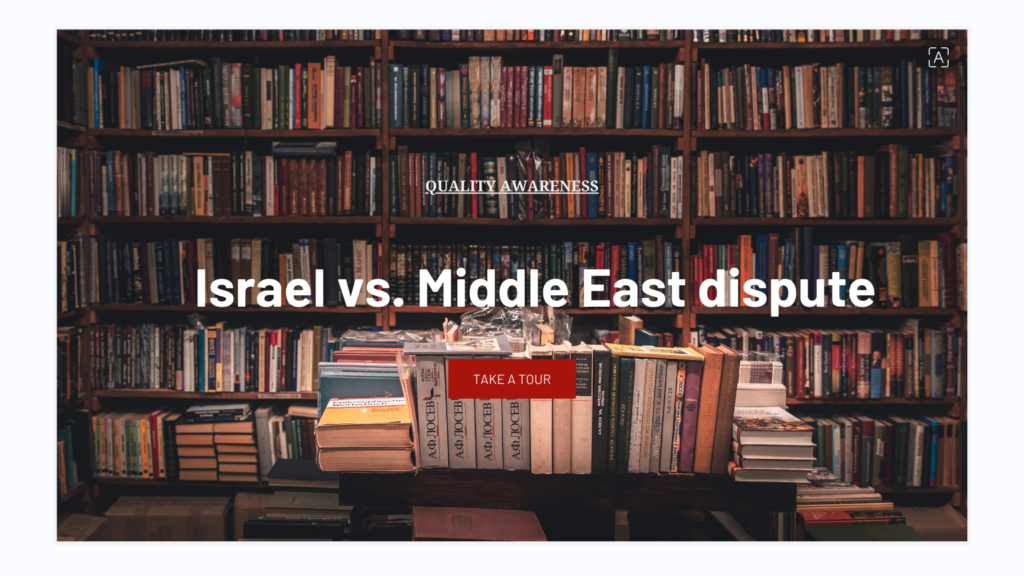The Israel vs. Middle East conflict is perhaps the longest-running conflict in human history, which has not yet found a lasting solution since its inception,

I. Introduction
Objectives : Introduce the conflict and its significance. Explain why it is perhaps important to understand the “main causes of Israel vs. Middle East conflict” in order to understand current events and the historical context.
The main points of this conflict are the complexity of the situation and the diverse viewpoints involved, which are as follows
II. Historical Background
A. Early Historical Claims
State that Jews and Arabs have deep historical ties to the land.
In the southwestern part of Arabia, known in ancient times as Himyar and roughly corresponding to Yemen today, the local population adopted Judaism sometime in the late fourth century, and by about 425 a Jewish kingdom had already taken shape. The conclusion is that Jews and Islam have been opposed to each other from the beginning.
B.Creation of Israel (1948)
State that the establishment of Israel in 1948 displaced the Palestinians and laid the foundation for future tensions. This is a fundamental aspect of the “main causes of Israel vs. Middle East” and can be seen to the present day.
III. Territorial disputes
A. Major areas involved
Both sides dispute the outline of specific areas such as the West Bank, Gaza Strip and East Jerusalem
B. Impact of the Six Day War of 1967
Analyze how the war changed the way in which we view
erritorial control
IV. National Identity and Self-Determination
A. Palestinian Nationalism
Palestinian nationalist objectives of the Arab–Israeli conflict in the 21st century include abolishing the refugee status of persons separated from their native lands during the 1948 Palestinian expulsions and exodus, a “right of return” exists to either occupied territory
B. Israeli Identit
The importance of Israel as a Jewish homeland. Jewish identity definition in Israel is complex and may include notions of religion, ethnicity, nationality, and family. Most secular Jews in Israel consider themselves Israelis first, while most Orthodox Jews consider themselves Jews first.
V. Religious importance
A. Jerusalem as a holy city
Jerusalem is equally important for Judaism, Islam and Christianity. The most sacred Western Wall of the Jews is located here. This city has been the karmabhoomi of Jesus Christ. It was from here that Prophet Hazrat Muhammad went on his journey to Mira
B. Religious tension and violence
The city of Jerusalem is important for three religions. Religious factors increase the conflict.
VI. Security concerns
A. Ongoing violence and terrorism
Violence is common due to the conflict between Israel and Palestine, which has led to the rise of terrorism (terrorism means:- In simple words, to achieve some objective in one or more states, challenging the rule of the state or states in an unconstitutional manner, not accepting contempt of court)
B. Role of militias and armed groups
Militia is a military force drawn from the general public of the country. Militia members are given limited military training and are available for emergency service. Generally, militias are used for local defense.
Militias work for security for one’s own state, in contrast, they are terrorists for the enemy state.
VII. International Involvement
Some of the main reasons for international involvement in the historical, political and social issue that is the Israeli-Palestinian conflict and wider tensions in the Middle East are:
A. Colonial Legacy
The end of the Ottoman Empire and subsequent British rule of Palestine
Jews sided with the British in World War II and were victorious, setting the stage for conflict between Jewish and Arab populations. The establishment of Israel in 1948 and the displacement of Palestinian Arabs (the Nakba) created lasting grievances and problems.
B . Geopolitical interests
Strategic location: Israel is located at the crossroads of Europe, Asia, and Africa. This location is a focal point for regional power dynamics. The world’s major nations often involve themselves to exert influence over this important region.
Oil and resources: The Middle East is rich in oil and gas, making it a vital region for global energy resource supply. These economic interests often drive partnerships when foreign policy is being formulated.
Conclusion
The conclusion about the conflict between Israel and the Middle East is that it is deeply rooted in a complex intertwining of historical grievances, territorial disputes and political ideologies. Some of the factors for this are:
Historical context
The legacy of colonialism and the establishment of Israel have created lasting tensions, particularly as the rights and status of Palestinians do not appear to have been addressed thoughtfully.
Geopolitical interests
The strategic importance of the region, driven by resources such as oil and gas, fuels diverse international interests and interventions.
Humanitarian issues
The ongoing violence and human rights violations have attracted global attention, necessitating humanitarian assistance and intervention.
Peace efforts
Several mediation efforts are attempting to find a lasting solution by the international community, including through the framework of a two-state solution.
